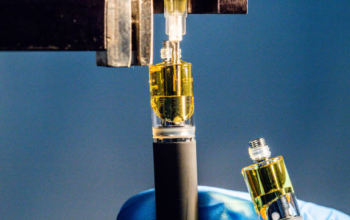Delta-9-tetrahydrocannabinol (Delta 9 THC) and tetrahydrocannabinolic acid (THCa) are two closely related compounds found in the cannabis plant. While they share some similarities, there are also important differences between them in terms of their chemical structure, effects, and legal status.
What is Delta 9 THC?
Delta 9 THC is the primary psychoactive compound in cannabis. When cannabis is heated or smoked, the THCa in the raw plant material is converted to Delta 9 THC through decarboxylation.
Delta 9 THC acts on the body’s endocannabinoid system, binding to CB1 receptors in the brain and nervous system. This produces the euphoric “high” associated with cannabis use, as well as potential therapeutic effects like pain relief, muscle relaxation, and appetite stimulation.
What is THCa?
THCa is the acidic precursor to Delta 9 THC found in raw and live cannabis. Unlike Delta 9 THC, THCa is non-psychoactive in its natural state. It does not produce the intoxicating effects associated with cannabis consumption.
However, THCa does have potential therapeutic properties of its own. Some preliminary research suggests it may have anti-inflammatory, neuroprotective, and anti-emetic effects. THCa-rich cannabis products, like THCa live resin, are growing in popularity for their unique profile of effects.
Key Differences
The main difference between delta 9 vs thc is that Delta 9 THC is psychoactive while THCa is not. Delta 9 THC produces the “high,” while THCa may offer therapeutic benefits without intoxication.
They also differ in their chemical structure. THCa has an extra carboxyl group that is removed through decarboxylation when cannabis is heated, converting it to Delta 9 THC.
From a legal perspective, Delta 9 THC is a controlled substance under federal law. However, THCa may be considered legal if derived from hemp, based on the 2018 Farm Bill which legalized hemp and its derivatives.
Consumption Methods
Delta 9 THC is typically consumed by smoking or vaporizing cannabis flower or concentrate products like wax, shatter, and live resin. It can also be consumed in edibles, tinctures, and capsules.
THCa is most often consumed in the form of raw cannabis juice, THCa-rich tinctures, or THCa live resin. Since heat converts THCa to Delta 9 THC, methods that avoid high temperatures can preserve the THCa content.
The Entourage Effect
Both Delta 9 THC and THCa are thought to work synergistically with other compounds in cannabis, like CBD, terpenes and flavonoids. This “entourage effect” theory suggests that the therapeutic potential of cannabis lies in the combined action of its many active ingredients, rather than just one isolated compound.
Final Thoughts
While Delta 9 THC and THCa are closely related, they have distinct differences in their effects and legal status. As cannabis science continues to evolve, we’re learning more about the unique properties and therapeutic potential of these fascinating compounds. Always consult your doctor and follow local laws when considering cannabis for medical or recreational purposes.



